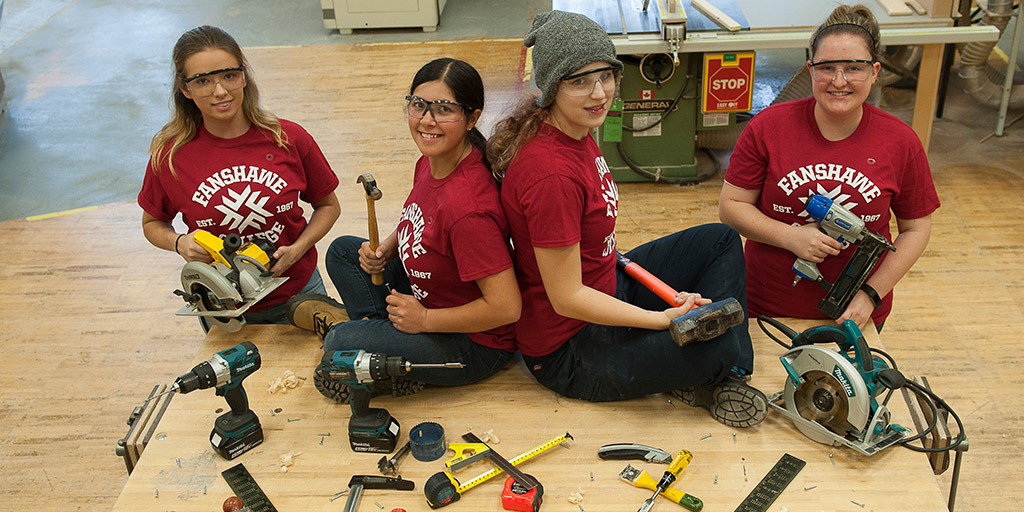A welcoming space for female students
 CREDIT: PROVIDED BY STEVE GEDIES
CREDIT: PROVIDED BY STEVE GEDIESLab sections offered for women in carpentry programs at Fanshawe College is allowing female students to learn in an inclusive environment to reach their potential and ensure success in the construction field.
An initiative that commenced in 2016 at Fanshawe is working to provide a supportive, hands-on learning environment for women with a passion for carpentry and renovation.
With only two per cent of the students in the carpentry programs at Fanshawe being female, this group has been lead to feel overwhelmed and underrepresented in the classroom.
Women in the carpentry programs now have the option to be enrolled in women only labs and take part in a mentorship initiative with other women working in the construction and carpentry fields.
Steve Gedies, a professor of Fanshawe's construction carpentry techniques, among others, in the Donald J. Smith School of Building Technology, has been the leading force in this much needed initiative.
“We provide women an option to be enrolled together for two of the many courses offered in year one of a potential three year program noting that all other classes and experiences are fully integrated with all of other students enrolled in the program” Gedies said.
These two courses are 90 per cent hands-on and female lab sections will allow the students to build confidence and overcome barriers not only at Fanshawe, but in their future workplaces.
“This program supports Fanshawe College's vision, mission and values � unlocking potential, providing an exceptional learning experience, and focusing on students while embracing change and engaging each other,” Gedies said. Offering women only lab sections will not only provide support for current students in the carpentry programs at Fanshawe, but also attract more females to apply to the programs.
Ashley Durnin is a former student in the construction carpentry techniques program at Fanshawe and was not offered a women only lab section while she was enrolled.
“For me, framing class was nothing short of overwhelming. I was surrounded by men, some who had experience, and some who did not. It really didn't matter who had experience or not for the guys, being the only female, I felt embarrassed; I did not want to make a mistake in front of a class full of young men, I wanted to portray perfection and prove that I could do it too, or even broader, that girls in general could do it too,” Durnin said.
Despite having to overcome the anxiety that came with being the only girl in her class, Durnin was able to complete the construction carpentry techniques and construction engineering technician programs and pursue a successful career in carpentry. She is now a co-chair of the London Home Builders Association (LHBA) careers committee, current chair of the construction carpentry techniques and construction engineering technician Program Advisory Committee (PAC), women's focus group(s) and an active employee of Saratoga Homes.
However, Durnin discussed how she would have received a better education had there been women only lab sections offered while she was at Fanshawe.
“The confidence these ladies will get from being able to do this lab on their own is going to have astounding effects. Their outlook on the entire program will change, and I think you will see a trend of more staying in for the CSN Program,” Durnin said.
A program like this will align with Fanshawe's goal to unlock potential and Durnin said she believes that this will change the futures of these women in carpentry.
A current student in the construction carpentry techniques program, Jessica Bell, is in her second year of the program and has been enrolled in the women lab sections offered.
“I know that this is a very male-dominated industry so learning like this may not seem beneficial (or maybe it sounds like I shouldn't even be pursuing this) as of course when I begin my career it won't be like this, but I am so thankful for the opportunity to learn in this atmosphere allowing me to understand, practice and ultimately grow as much as I have this past year so that I can be as prepared as possible for the real world,” Bell said.
Having experience in both female only and mixed labs, Bell said she has noticed a difference in the two group's learning styles and approaches to their work.
“If it helps, compare it to offering a class both online and in-class allowing people to pick which [one works] with their learning style more. There are so many women interested in getting into trades and unfortunately it's not presented as a path to explore as often and if this is something to help get the numbers up then I hope it's something that is further discussed,” Bell said.
To learn more about the women in carpentry initiative, visit www.fanshawec.ca.














